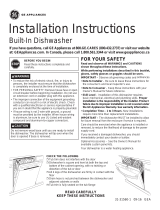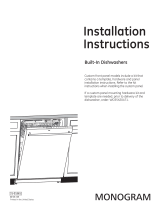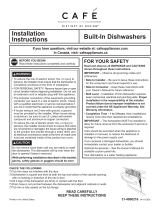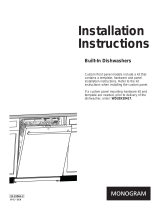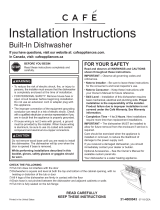
For models equipped with power cord: Do not modify the plug
provided with the appliance; if it will not fit the outlet, have a
proper outlet installed by a qualified technician.
Cabinet Preparation & Wire Routing
• The wiring may enter the opening from either side, rear or the
floor within the shaded area illustrated above in Figure E and
defined in Figure A.
• Cut a 1-1/2" maximum diameter hole to admit the electrical
cable. Permanent wiring connections may pass through the
same hole as the drain hose and hot water line, if convenient.
If cabinet wall is metal, the hole edge must be covered with a
bushing.
NOTE: Power cords with plug must pass through a separate
hole.
Electrical Connection to Dishwasher
Electrical connection is on the right front of dishwasher.
• For permanent connections the cable must be routed as
shown in Figure E. Cable must extend a minimum of 24" from
the rear wall.
• For power cord connections, install a 3-prong grounding
type receptacle in the sink cabinet rear wall, 6" min. or 18"
maximum from the opening, 6" to 18" above the floor.
PREPARE ELECTRICAL WIRING
Electrical Requirements
• This appliance must be supplied with 120V, 60 Hz., and
connected to an individual properly grounded branch circuit,
protected by a 15- or 20-ampere circuit breaker or time-
delay fuse.
• Wiring must be 2 wire with ground and rated for 75°C (176°F).
• If the electrical supply does not meet the above requirements,
call a licensed electrician before proceeding.
Grounding Instructions–Permanent Connection
This appliance must be connected to a grounded metal,
permanent wiring system, or an equipment-grounding
conductor must be run with the circuit conductors and be
connected to the equipment-grounding terminal or lead on
the appliance.
Grounding Instructions–Power Cord Models
This appliance must be grounded. In the event of a malfunction
or breakdown, grounding will reduce the risk of electric shock
by providing a path of least resistance for electric current.
This appliance is equipped with a cord having an equipment-
grounding conductor and a grounding plug. The plug must
be plugged into an appropriate outlet that is installed and
grounded in accordance with all local codes and ordinances.
White
18"
6"
24"
from Wall
3"
from
Cabinet
Alternate
Receptacle
Location
Ground
Black
1-1/2" Dia. Hole (Max.)
18"
6"
Receptacle
Location
Area
Figure E
Installation Preparation
4
WARNING:
FOR PERSONAL SAFETY: Remove house fuse or open circuit breaker
before beginning installation. Do not use an extension cord or
adapter plug with this appliance.
ADVERTENCIA:
PARA SEGURIDAD PERSONAL: Quite el fusible o abra el interruptor
de circuitos antes de comenzar la instalación. No utilice un cable
de extensión o un enchufe adaptador con este artefacto.
WARNING:
The improper connection of the equipment grounding conductor
can result in a risk of electric shock. Check with a qualifi ed
electrician or service representative if you are in doubt that
the appliance is properly grounded.
ADVERTENCIA:
La conexión inadecuada del conductor de conexión a tierra del
equipamiento puede provocar un riesgo de descarga eléctrica.
Consulte a un electricista califi cado o representante de servicio
técnico si tiene dudas sobre la correcta conexión a tierra del aparato.















